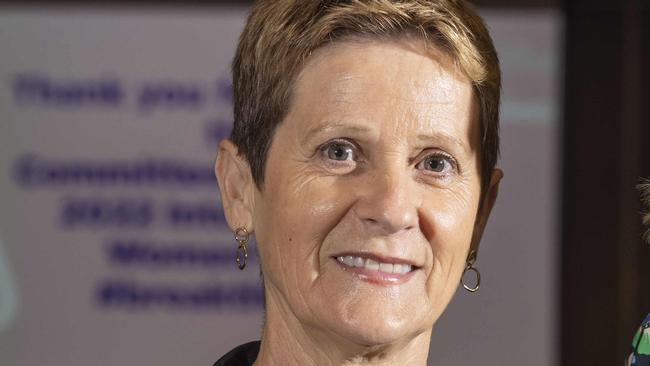‘It’s a very grey area’: How coercive control is impacting the region
Criminalising coercive control is a movement that is gaining momentum, but despite recognising its role in causing death or serious injury, the Victorian government is not joining the pack. Here is why.
Geelong
Don't miss out on the headlines from Geelong. Followed categories will be added to My News.
Sandy Johnston and her children faced life-threatening abuse at the hands of her former partner.
She is the survivor of long-term abuse that involved stalking and coercive behaviour, but because there was no physical violence, for a long time Ms Johnston did not recognise her situation.
She couldn’t settle, she felt constantly uneasy and even fearful, but the realisation she was being abused did not come until after police intervened.
Her abuser was convicted of stalking-related offences in breach of an intervention order and served two jail terms for these crimes. Meanwhile Ms Johnston and her children fled to the Bellarine Peninsula.
Her story has been highlighted at a time when the Queensland government has vowed to introduce a law by 2023 criminalising coercive control and the New South Wales government has previously made a similar commitment. The United Kingdom criminalised it in 2015.
In Victoria, the Royal Commission into Family Violence considered the introduction of specific offences but the government decided against it.
This was despite recognising that coercive control increased the likelihood of victims being killed or seriously injured.
The state’s Family Violence Protection Act 2008 includes coercive behaviour in its definition of family violence, meaning it can constitute a breach of a Family Violence Intervention Order (FVIO) — a criminal offence.
Behaviours which constitute coercive control also form part of other existing criminal offences.
In the Greater Geelong area, 51 family violence-related stalking offences were recorded in 2021 but only 36 incidents resulted in charges.
There were 109 instances of family violence-related harassment but only 29 charges were laid. There was also 190 recorded offences for threatening behaviour in relation to family violence that resulted in 109 charges.
Victoria Police says the disparity could be due to reasons such as insufficient evidence, victim survivors choosing not to provide a statement and some seeking a civil remedy rather than criminal charges.

Ms Johnston said like many women, she did not initially recognise coercive control as abuse.
“Many women don’t actually understand what abuse looks like,” she said.
“When a woman is physically harmed by a partner it’s black and white, it is very clear what is happening to her, it is irrefutable and you can clearly say that constitutes violence and that is absolutely not OK.
“But when it comes to psychological abuse and coercive control, it’s a very grey area; it’s very hard to distinguish what is happening to you at the time.”
Ms Johnston, who is the host of the podcast Tiaras Tears and Triumphs, provides help for women who are experiencing abuse — marking over 100 episodes.
“My ‘ah ha’ moment happened when my children were quite young; they were in a daycare program and another mother there happened to be a police officer,” she said.
“I just had some general conversations about some of the things that were happening in my life and my relationship, and she was quick to point out that it was abuse and I needed to seek help from police.”
Ms Johnston started her podcast in 2020 — six years after she left her abusive relationship — and often interviews experts or those with lived experiences in order to help women recognise abuse in all its forms, and prepare them for life after leaving.
“I had already escaped my abusive relationship, I had gone through the upheaval and trauma,” she said.
“What prompted me to do the podcast was the rate of domestic violence escalating when Covid started spreading around the world, and I always had it in my heart to do something to help other women who are in that situation or have left and are trying to pick up the pieces.”
Despite some advocacy groups arguing that creating specific laws would help women, other experts, including Sexual Assault and Family Violence (SAFV) Centre chief executive officer Helen Bolton, said it could do the opposite.

“Reducing coercive control to a stand-alone tactic or type of family violence risks simplifying the power and control dynamics that are central to identifying and understanding the complex and unique experience of coercive control,” she said.
“This potentially reinforces incident-based responses to family violence by looking at ‘events of coercive control’, rather than considering the totality of a victim-survivor’s experience and the pattern of abuse that has been perpetrated against them.
“Criminalising coercive control and any legal changes is not going to change the prevalence or behaviours that family violence perpetrators use.
“While coercive control is not currently criminalised in Victoria, use of coercive control tactics such as emotional abuse, monitoring activity and financial abuse may be considered breaches of the FVIO.”
Ms Bolton said although there was increasing awareness in the community about coercive control, it was difficult to expose.
“It is part of the pattern of power and control that many family violence perpetrators use to incite fear and continue control over their victims,” she said.
Coercive control can be difficult to define and can take many forms. Patterns of behaviour include isolating partners from friends and family, monitoring activities, undermining independence, jealousy, threats and intimidation or degradation, and actions that can instil fear, dread or powerlessness.
A UK law gazette said that since criminalising coercive controlling behaviours (CCB) in 2015 there had not been a significant increase in the number of charges laid.
It said a government review published in May 2021 showed the number of recorded offences was increasing each year. A total of 24,856 incidents were recorded in the UK in 2019/20, but in the previous year only six per cent of incidents resulted in charges being laid.
UK solicitor Harriet Wistrich, director of the Centre for Women’s Justice, was reported in the gazette as saying: “The problem is that [the CCB offence] isn’t used enough or understood well enough by criminal law enforcement.”
She said law-enforcement officers often attempted to prosecute a single offence rather than recognise coercive control as a pattern of behaviour.

Detective Senior Sergeant Nick Uebergang from the Geelong Family Violence Investigation Unit said police took every single report of family violence seriously.
Victoria Police assess for coercive controlling behaviours by completing a Family Violence Report — referred to as an L17 — which is a six-page report that has 39 questions to establish the likelihood of future violence and the seriousness of certain behaviours.
One question in this report is about whether the victim is experiencing coercive control.
“As part of our initial response to an incident or report we will complete a risk assessment of the victim, their children and the perpetrator to determine the appropriate action to keep vulnerable family members safe,” Snr-Sgt Uebergang said.
“These actions can include taking out a Family Violence Intervention Order on the perpetrator and referring everyone involved to specialised support service for ongoing support.”
Officers receive additional training at the Victoria Police Family Violence Centre of Learning, where they are taught how to recognise signs of various coercive controlling tactics.
A Victorian Government spokeswoman said the government was working to end family violence in all its forms.
“The Victorian Family Violence Protection Act includes coercive behaviour in its definition of family violence, meaning that coercive control can constitute a criminal offence in Victoria,” she said.
“We will always consider further ways to end family violence – and we will continue to listen to advice from the experts and keep victims survivor voices at the heart of this work.
“We recognise there is a diversity of views on any legislative change. Extensive consultation would be a key part of any further reform.”
More Coverage
Originally published as ‘It’s a very grey area’: How coercive control is impacting the region




